Quantitative Aptitude Exam Paper Pattern Syllabus - Apex
We often hear things like “A goal without a plan is just a wish” and “An hour of planning can save you 10 hours of doing.” While all of it is completely true, why do we often fail to plan and even if we do make the perfect plan, things always go awry and we end up going back to square one. Soon enough it becomes “A new day, A new beginning” and we’re now making the next best plan. Well, the answer is fairly simple. We’re not gonna like it, but it really is fairly simple. We tend to overestimate our abilities when our motivation is high. But fail to consider that as we go on, motivation starts getting lower and now you’re either bored, exhausted or you just hate doing it anymore.
Why are we talking about this here though? Motivation, overestimating abilities, exhaustion, boredom and so on..seem kind of off track, doesn't it? Well, this is what the next one year is going to look like for any CAT aspirant. CAT is nothing like the exams that we usually prepare for. It’s way different from your mid terms or semester end examinations that most of us sail through comfortably even with just 2-3 days of preparation. What makes it different is not just one thing but a set of skills and abilities, like the depth of knowledge you hold about a topic, skills as basic as calculation speed, accuracy, reading speed, perfect comprehension, strong analytical ability, logical thinking, high mental stamina, etc, all of which require to be honed over a longer period of time. Hence, if you are a CAT aspirant get used to these three words: “Discipline, Consistency and Persistence”.
Discipline: Create a study schedule and stick to it, come what may. If you are a working professional or a student, chances are that you have a tight schedule and can only dedicate a few hours to your preparation. In that case, this blog will help you determine exactly what and how much to cover on a daily and monthly basis to ensure you complete your syllabus on time and have enough time for level 2 & level 3 practice, mocks and sectionals.
Consistency: Like we discussed, CAT requires you to develop and hone a certain set of skills that can be done only over a period of time. Hence, you must dedicate time to your CAT preparation every single day.
Persistence: If you look at interviews of students studying in Top B-schools right now who have successfully cleared CAT, there’s one common statement that each one of them has made and that is “CAT is a roller coaster ride with lots of ups and downs.” You will have good days and bad days, you will have great mocks and worse mocks, but through it all, you have to keep going. Like the saying goes “If you’re going through hell, keep going. Why would you stop in hell?”
All about Quantitative Aptitude
Quantitative Aptitude (QA) is the only section in the CAT that has a specific syllabus, unlike VARC and LRDI. It consists of chapters that we come across from 8th grade and upwards. However, what makes it challenging is a combination of two things: depth of conceptual understanding and application of theory into practical real world problems. Another thing that makes QA challenging is the structure of problems asked which usually seem extremely complicated at first sight but gradually turn up to be a group of individual questions ranging from different chapters all combined into one problem. The only way to ace your QA section will be to master all the concepts and practice different kinds of questions to such a degree that you can easily solve any type of question, at any level of difficulty, irrespective of how twisted it might seem to be. Hence, it is recommended to cover all your concepts as soon as possible so that you have enough time to practice a multitude of problems.
QA Paper Pattern
The Quantitative Aptitude section of the CAT tests candidates on their problem solving ability. In this section you will come across questions that seem complicated and twisted at first glance, but as you adapt through your daily practices and master concept clarity you will realize that every question is just a bunch of individual questions taken from a variety of chapters and combined into a single problem. The following is the paper pattern for the QA section in CAT.
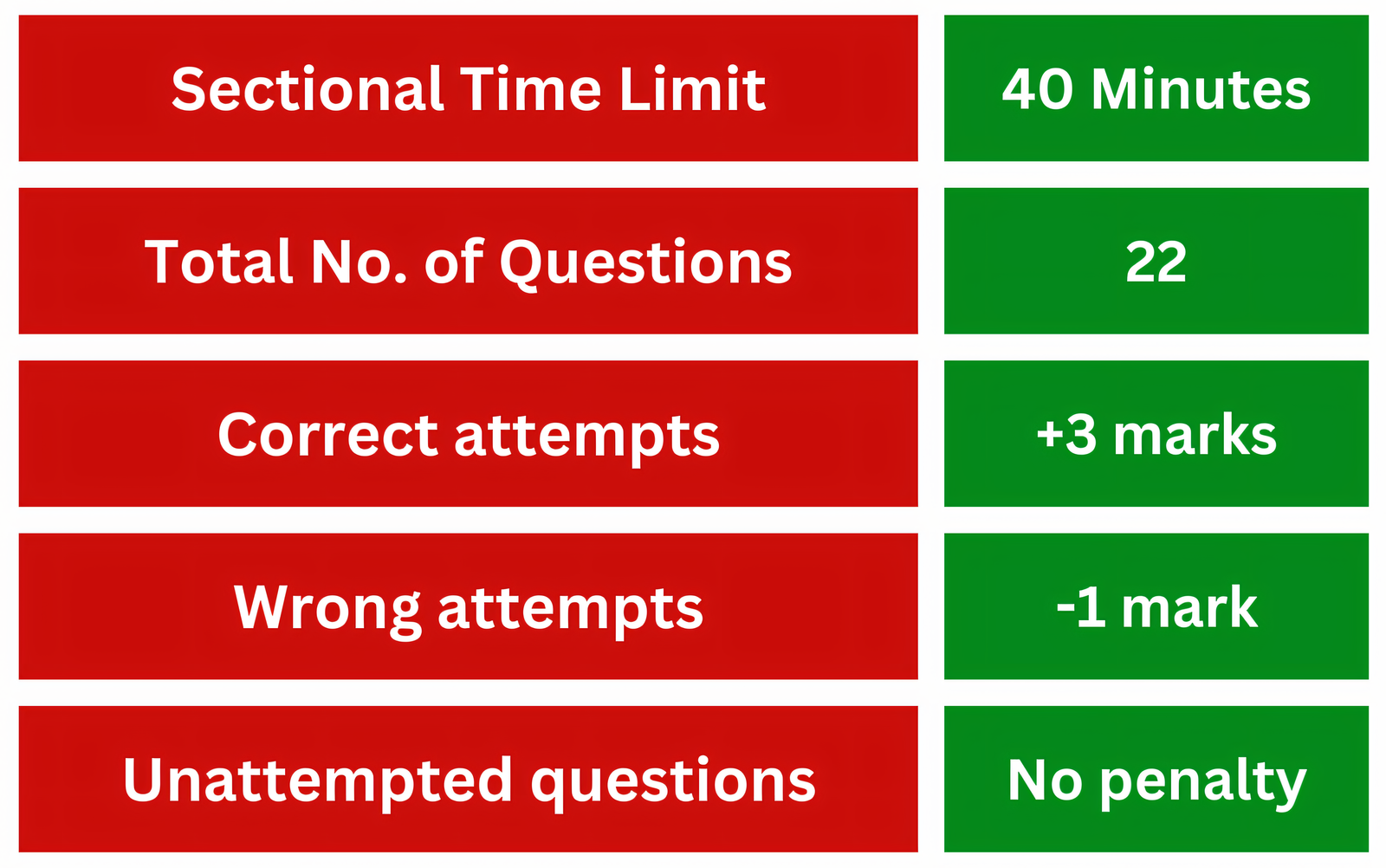
SYLLABUS FOR QUANTITATIVE APTITUDE

As you can see the QA section is majorly divided into 5 Units namely Arithmetic, Algebra, Geometry, Number System and Modern Math in the same order of priority. Although the weightage derived from a keen observation of previous year papers states that majority of the quant section consists of questions from Arithmetic and Algebra, and the least number of questions usually come from Modern Math; it is highly advised that a candidate should not leave any topic just on the basis of weightage as CAT is highly unpredictable, as seen in CAT 2023 and you never know what is thrown your way. The weightage of topics should only tell you the order of priority when you start your preparation. Ensure that you complete the most important topics first and that you start your preparation early enough to complete all the chapters way before the month of examination. Now that we’ve gotten an overview of the syllabus, let’s get into the 7-Month study plan that’ll help you determine what your minimum daily target should be to aim for a 99+ percentile. Again, please remember that the more you practice & master your concepts the better your chances of acing the QA section. But in case you are a working professional or a student with a tight schedule, this blog will help you determine the minimum daily target that you’ll need to hit consistently to aim for a 99+ percentile.
7-Month Study Schedule for QA


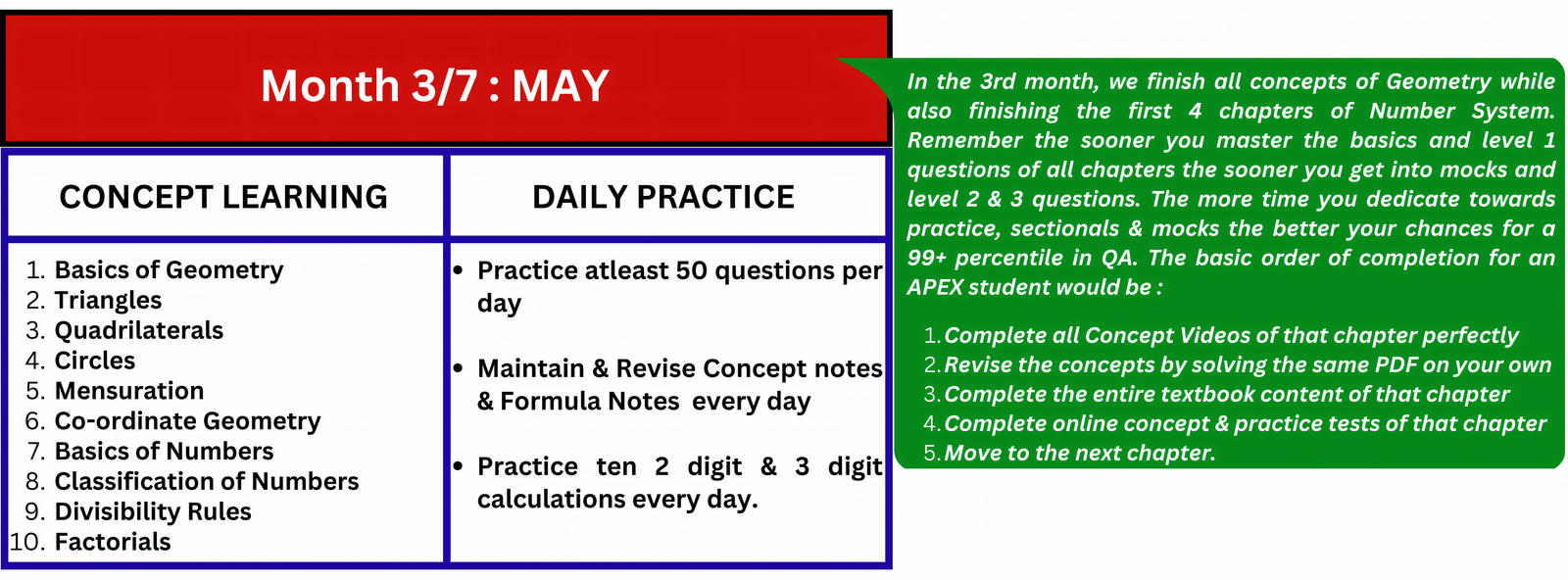

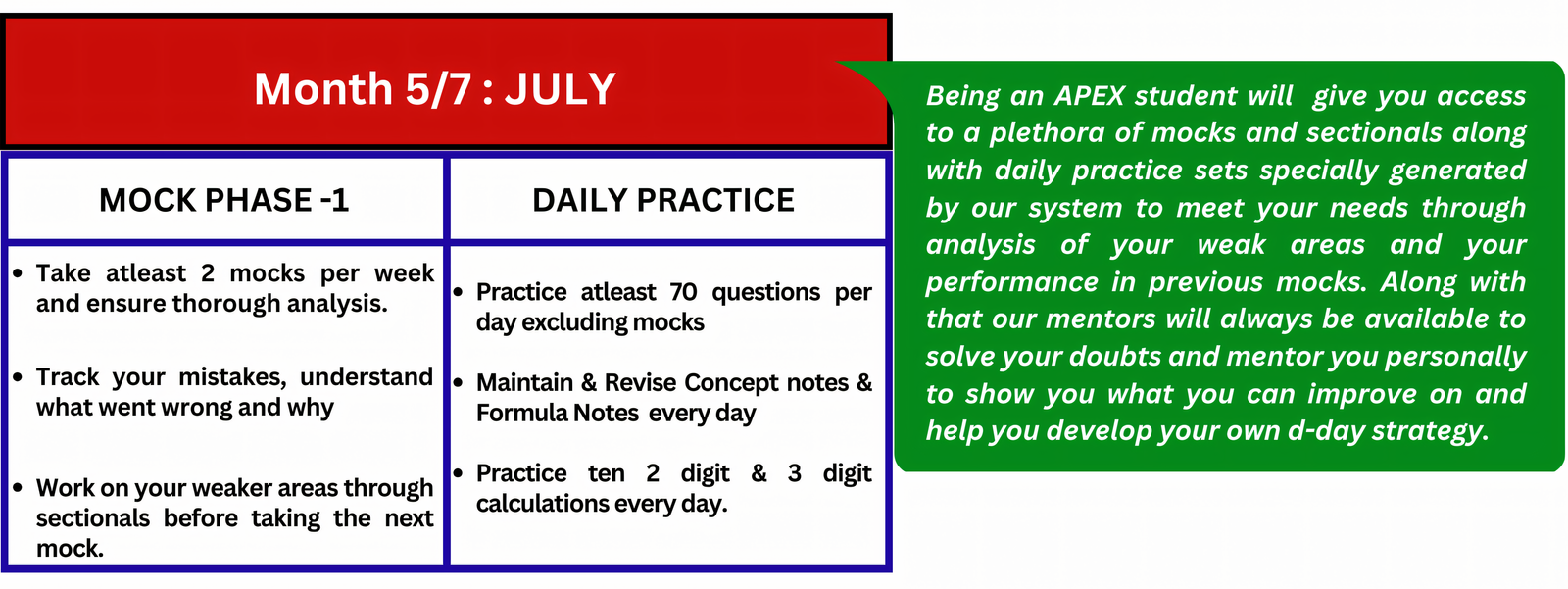
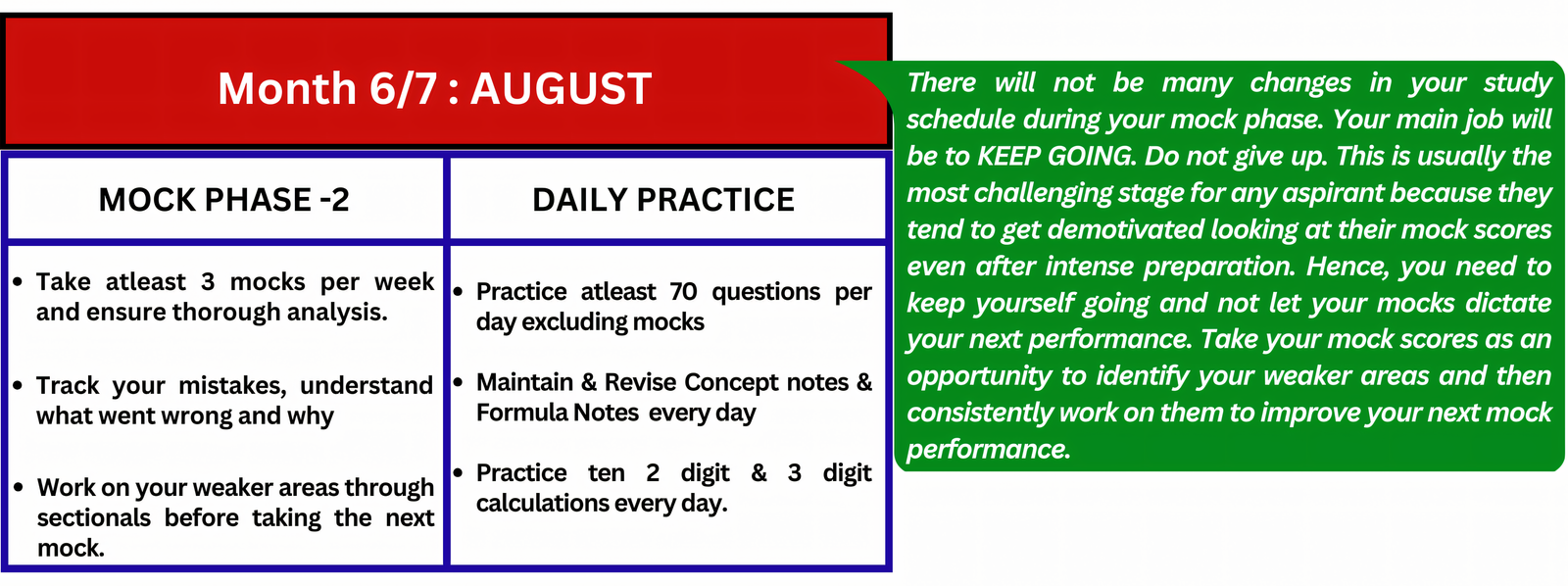
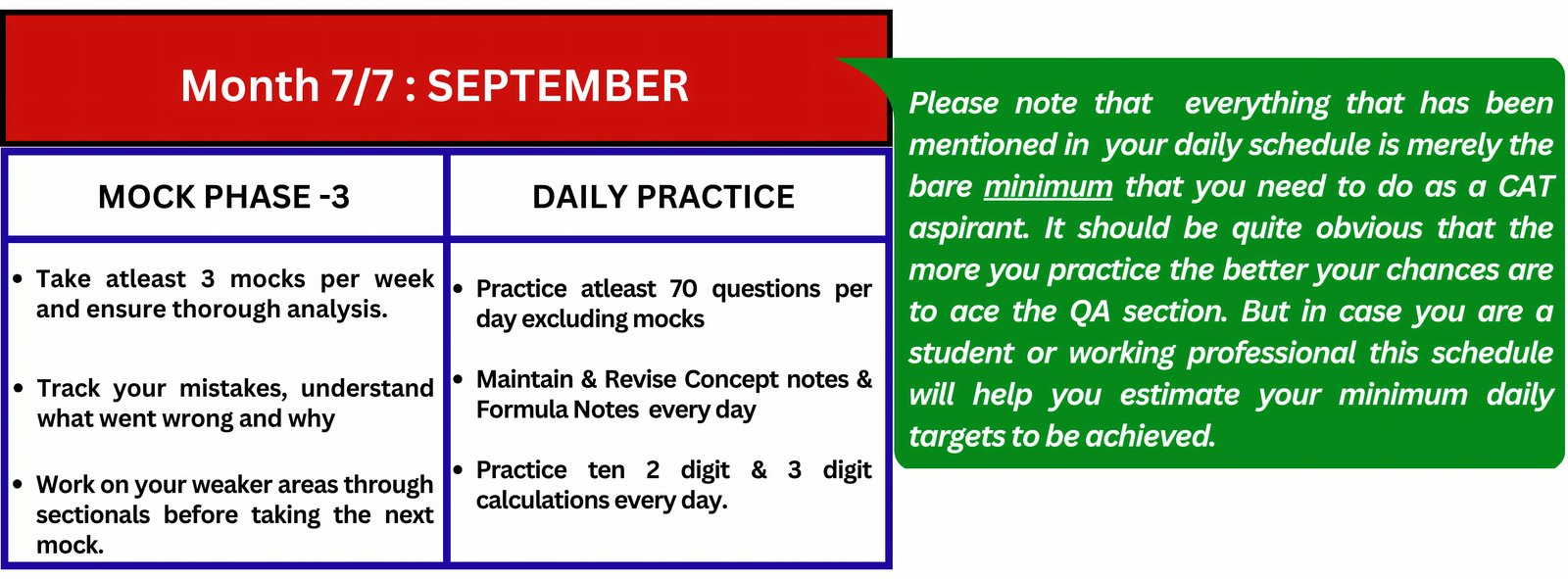
Keep in mind that during the Mock Phase, there won’t be too many changes in your schedule, instead the major challenge will be to keep yourself motivated even if your mock scores fluctuate. This is usually the most challenging time for an aspirant as they tend to get demotivated after looking at their mock scores even after intense preparation. Your job will be to just KEEP GOING! Do not give up. Instead, look at your mock scores as an opportunity for you to identify your weaker areas. If you think about it, mocks are an aspirant's best friend! They tell you exactly what you need to hear, whether you like it or not. But in that process, you get genuine feedback which will further help you improve on areas that require extra effort from your side so that you can ultimately do well on your D-day!
By the end of October, you’ll have finished the entire QA syllabus and have practiced enough questions through daily practice, mocks, and sectionals. Remember, hard work always pays off! As long as you know in your heart and soul that you’ve done your very best until the end, you will see results! We, at APEX, genuinely hope that this blog will help you find clarity and structure in your daily study schedule. Of course, you are always welcome to join us at APEX. We have a wonderful community of students and mentors who genuinely value your preparation journey and are willing to help you in every way we can! Be it personal mentoring or creating a personalized schedule to meet your needs, we are more than willing to be a part of your incredible success story! At APEX, you will be provided with everything you need for your preparation journey making it easier for you to spend your valuable time only on learning. APEX is looking forward to being a part of your journey!
.png)
